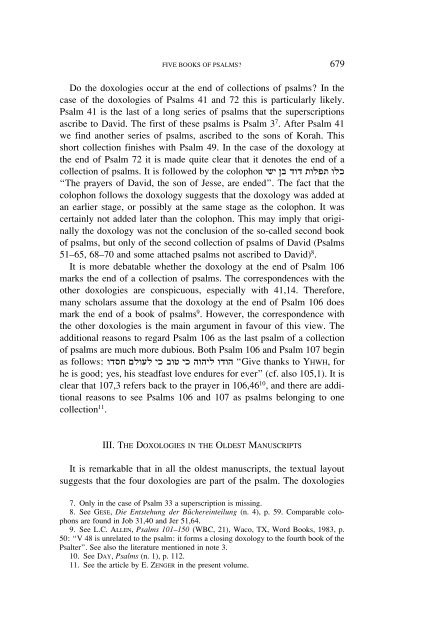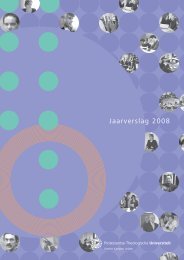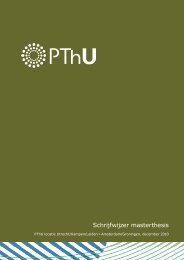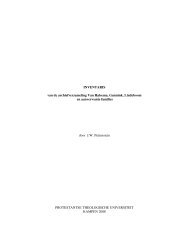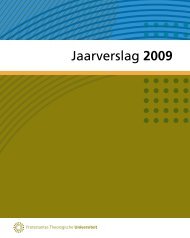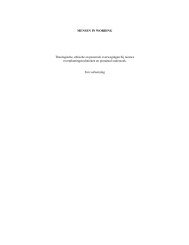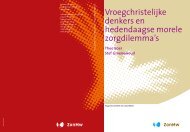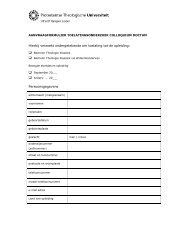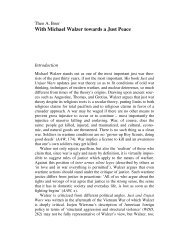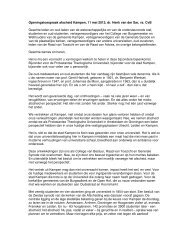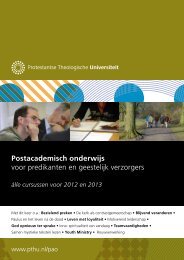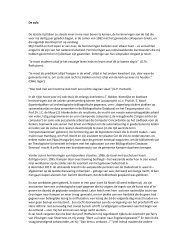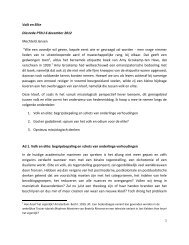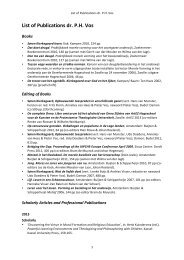the composition of the book of psalms - Protestantse Theologische ...
the composition of the book of psalms - Protestantse Theologische ...
the composition of the book of psalms - Protestantse Theologische ...
Create successful ePaper yourself
Turn your PDF publications into a flip-book with our unique Google optimized e-Paper software.
FIVE BOOKS OF PSALMS? 679Do <strong>the</strong> doxologies occur at <strong>the</strong> end <strong>of</strong> collections <strong>of</strong> <strong>psalms</strong>? In <strong>the</strong>case <strong>of</strong> <strong>the</strong> doxologies <strong>of</strong> Psalms 41 and 72 this is particularly likely.Psalm 41 is <strong>the</strong> last <strong>of</strong> a long series <strong>of</strong> <strong>psalms</strong> that <strong>the</strong> superscriptionsascribe to David. The first <strong>of</strong> <strong>the</strong>se <strong>psalms</strong> is Psalm 3 7 . After Psalm 41we find ano<strong>the</strong>r series <strong>of</strong> <strong>psalms</strong>, ascribed to <strong>the</strong> sons <strong>of</strong> Korah. Thisshort collection finishes with Psalm 49. In <strong>the</strong> case <strong>of</strong> <strong>the</strong> doxology at<strong>the</strong> end <strong>of</strong> Psalm 72 it is made quite clear that it denotes <strong>the</strong> end <strong>of</strong> aכלו תפלות דוד בן ישי collection <strong>of</strong> <strong>psalms</strong>. It is followed by <strong>the</strong> colophon“The prayers <strong>of</strong> David, <strong>the</strong> son <strong>of</strong> Jesse, are ended”. The fact that <strong>the</strong>colophon follows <strong>the</strong> doxology suggests that <strong>the</strong> doxology was added atan earlier stage, or possibly at <strong>the</strong> same stage as <strong>the</strong> colophon. It wascertainly not added later than <strong>the</strong> colophon. This may imply that originally<strong>the</strong> doxology was not <strong>the</strong> conclusion <strong>of</strong> <strong>the</strong> so-called second <strong>book</strong><strong>of</strong> <strong>psalms</strong>, but only <strong>of</strong> <strong>the</strong> second collection <strong>of</strong> <strong>psalms</strong> <strong>of</strong> David (Psalms51–65, 68–70 and some attached <strong>psalms</strong> not ascribed to David) 8 .It is more debatable whe<strong>the</strong>r <strong>the</strong> doxology at <strong>the</strong> end <strong>of</strong> Psalm 106marks <strong>the</strong> end <strong>of</strong> a collection <strong>of</strong> <strong>psalms</strong>. The correspondences with <strong>the</strong>o<strong>the</strong>r doxologies are conspicuous, especially with 41,14. Therefore,many scholars assume that <strong>the</strong> doxology at <strong>the</strong> end <strong>of</strong> Psalm 106 doesmark <strong>the</strong> end <strong>of</strong> a <strong>book</strong> <strong>of</strong> <strong>psalms</strong> 9 . However, <strong>the</strong> correspondence with<strong>the</strong> o<strong>the</strong>r doxologies is <strong>the</strong> main argument in favour <strong>of</strong> this view. Theadditional reasons to regard Psalm 106 as <strong>the</strong> last psalm <strong>of</strong> a collection<strong>of</strong> <strong>psalms</strong> are much more dubious. Both Psalm 106 and Psalm 107 beginas follows: הודו ליהוה כי טוב כי לעולם חסדו “Give thanks to YHWH, forhe is good; yes, his steadfast love endures for ever” (cf. also 105,1). It isclear that 107,3 refers back to <strong>the</strong> prayer in 106,46 10 , and <strong>the</strong>re are additionalreasons to see Psalms 106 and 107 as <strong>psalms</strong> belonging to onecollection 11 .III. THE DOXOLOGIES IN THE OLDEST MANUSCRIPTSIt is remarkable that in all <strong>the</strong> oldest manuscripts, <strong>the</strong> textual layoutsuggests that <strong>the</strong> four doxologies are part <strong>of</strong> <strong>the</strong> psalm. The doxologies7. Only in <strong>the</strong> case <strong>of</strong> Psalm 33 a superscription is missing.8. See GESE, Die Entstehung der Büchereinteilung (n. 4), p. 59. Comparable colophonsare found in Job 31,40 and Jer 51,64.9. See L.C. ALLEN, Psalms 101–150 (WBC, 21), Waco, TX, Word Books, 1983, p.50: “V 48 is unrelated to <strong>the</strong> psalm: it forms a closing doxology to <strong>the</strong> fourth <strong>book</strong> <strong>of</strong> <strong>the</strong>Psalter”. See also <strong>the</strong> literature mentioned in note 3.10. See DAY, Psalms (n. 1), p. 112.11. See <strong>the</strong> article by E. ZENGER in <strong>the</strong> present volume.


